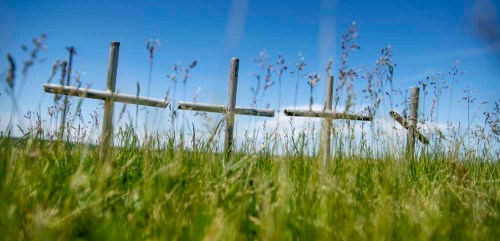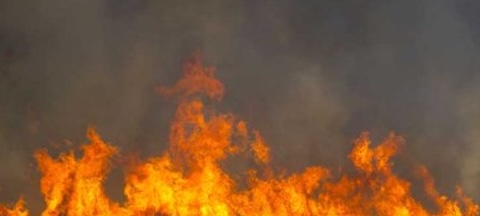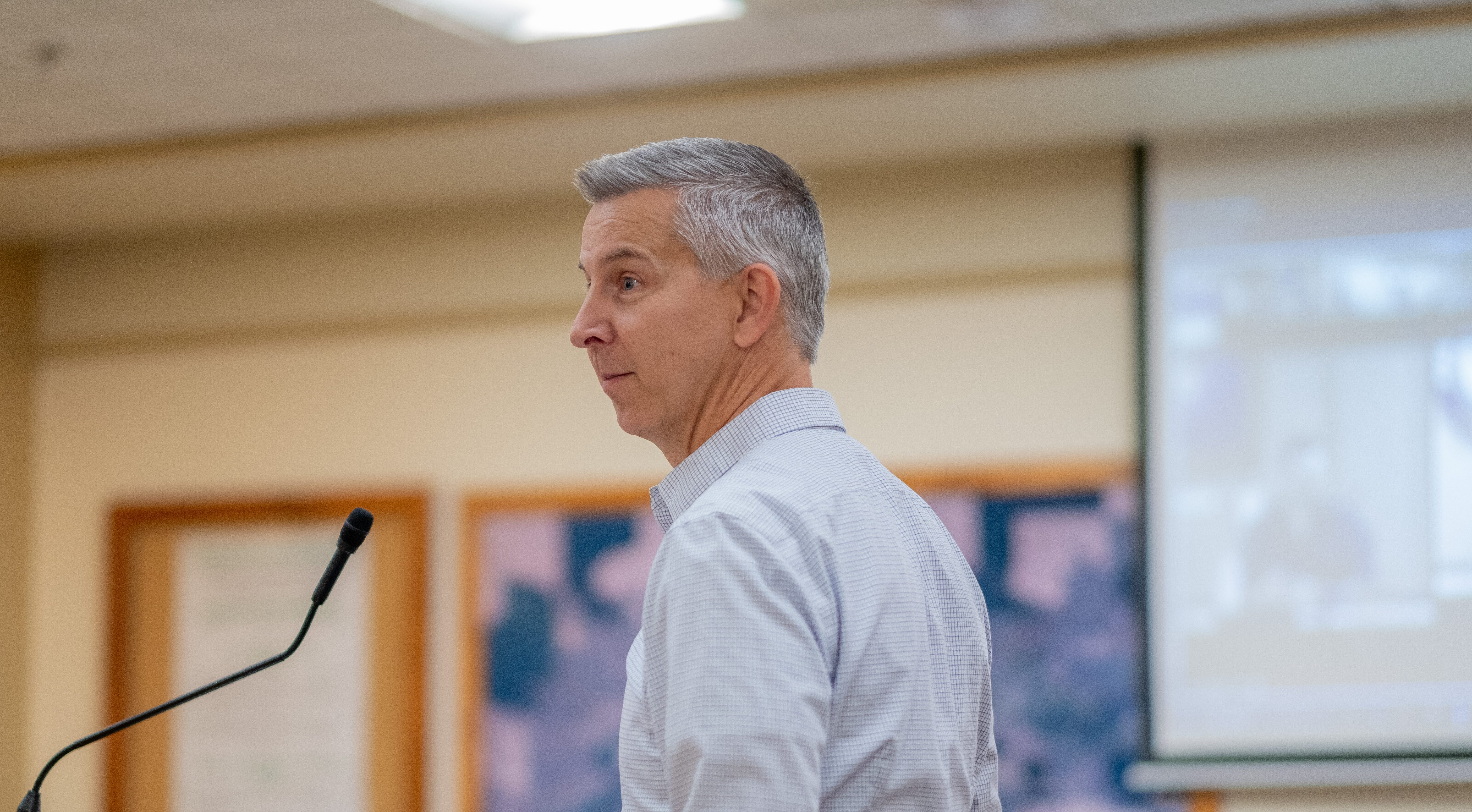Weston Cemetery: A community’s historic treasure in rural Oregon
Published 5:00 am Thursday, June 10, 2021

- Some graves at Weston Cemetery are marked as simply as this one, others not at all.
WESTON — It’s hard for Zach Mayer to draw a line between where his board service on the Weston Cemetery District ends and family life begins.
Mayer, along with Duane Thul and Sallie McCullough, make up the elected, volunteer board in charge of keeping these 9 acres functioning well enough to house the dead and serve the living.
Trending
The job is not only an honor for Mayer, but a multi-pronged connection to his heritage, he said.
That line to the Weston Cemetery began with his great-great-grandfather, Alex “Bump” McCorkell.
When he retired from farming in 1946, McCorkell moved off the nearby mountain and became the first dedicated cemetery sexton for the unincorporated town.
The title fails to portray the range of duties involved, from coordinating property care to managing legal and public records associated with burials, stocking supplies and resetting headstones.
Before McCorkell took the sexton position, according to local legends, families dug graves for their own in this spot atop a rolling hill just outside of town.
“Because people didn’t have any money for funerals,” recalled McCorkell’s granddaughter, Amy McCorkell Mayer. “People would go at night and bury their babies.”
Trending
Cemetery dates back to 1870s
Indeed, the earliest recorded burial at Weston Cemetery was of an infant in 1873, five years before Weston officially became a city, said area historian Sheldon Delph, also descended from a branch of the McCorkells.
The land for the original cemetery was donated from the homestead of Isham E. Saling, who left Walla Walla to settle in Weston and establish himself as a merchant around that time.
More land was added later, especially when the 1893 diphtheria and 1918 Spanish flu epidemics claimed numerous lives, including entire families, Delph said.
The cemetery became its own taxing district in 1950, meaning public money was available to pay McCorkell a wage and keep up with repairs and improvements.
“In Umatilla County, there are nine cemetery districts,” the historian said. “Weston is Cemetery District No. 2.”
Early on, numerous graves were marked with wooden memorials or not at all. Grass fires were known to decimate the area, burning away homemade crosses and other markers.
The cemetery McCorkell first took on 75 years ago was more wild space than not. Weeds were free range and the hand-dug graves nearly so, Zach Mayer said.
“Anytime he would be digging a new grave and find remains, he’d have to stop and find a new spot,” he said.
Zach Mayer heard much of the history of the cemetery as a child, he said, listening to voices from board meetings — including his grandfather’s and father’s — coming from the basement during frequent visits to his McCorkell grandparents.
“And now I live in the same place. I bought my grandparents’ house,” he said with a chuckle.
The past is layered over Weston Cemetery in every way.
McCorkell died in 1966, and his grandson, Donnell “Donnie” Smock, took over sexton duties in 1967 until his retirement in 1997.
Smock’s contributions included making the cemetery a landscaped showcase, caring for about 1,000 tombstones and trimming almost that many trees.
Zach Mayer’s older sister, Becky Betts, made her first land purchase there, choosing the plot where she’d spent many childhood hours reading and doing homework, he said.
Minding the past
As the family lineage aged, so did the land. Locust trees planted a century ago became hazards to the safety of present and future visitors.
Headstones made of hard materials, such as marble and granite, still stand, but most sandstone markers have crumbled to the toppling point or been lost to the hard winds altogether.
Some stones were centered over a grave, and as the earth settled, those markers have sunk into the ground.
Burial records are kept in a card file, the sort once the staple of every public library. Plots are marked out on painted plywood pieces propped up in the cemetery office, divided up into the “old city” and newer sections.
A few of the five-grave rectangles drawn in Sharpie bear a question mark instead of a name, leaving behind no witness to the occupant.
“It’s a very antiquated system,” said Duane Thul on a recent tour.
“We’re still living in two centuries ago,” he said. “We could have entered the 19th century, maybe.”
Thul, who was re-elected as Weston’s mayor in November, is now the unofficial sexton on an as-needed basis.
On this day, the surrounding hills are softly green with mid-May growth and the oft-wicked wind is gentle for the moment.
Only the scent of processing onions wafting over the town from Smith Frozen Foods speaks of the present on this spot.
As Thul gazed over rows of headstones, both upright and tilted over, he recalled the difficult and unpopular decision to take out dozens of failing trees in recent years.
It was a job that had been ignored for too long, and a tragedy waiting to happen should a limb fall on someone, Thul said.
Locust was a terrible choice for cemetery trees, he said.
“But they brought them up by the wagon loads 100 years ago, and that’s what got planted,” Thul said.
Ensuring the future
Plans call for new, suitable trees and native plants to go in the ground. The new growth will add shade and provide cooling, which will reduce water use.
Trees are expensive, however, and the cemetery’s budget from taxes is about $40,000 a year. That has to cover wind damage fixes, irrigation, building upkeep and more. The cost of electricity to run the water pumps rings up at about $700 a month, Thul said.
As well, the cemetery board has voted to hire an expert with underground imaging equipment to detect old, unmarked graves in the original section — plots can’t be sold there until that’s done.
There is no longer a paid employee, although the mowing and grave digging tasks are contracted out, Thul said.
The worst part of the small budget is having no paid attendant on the grounds during the day, he said, to the consternation of some residents.
The cemetery’s main gate is kept locked when Thul or another board member can’t be on site to help prevent theft and vandalism.
While he does his best to accommodate those who want to drive inside the locked gates, the timing does not always work out, Thul said, conceding his 82 years of age and mayoral duties dictate his schedule some days.
“It’s just me. Anyone who wants to come and look at a grave or buy a plot, it’s me. And I am getting off the board,” he said, noting the two other board members have full-time jobs.
But his wish list for the Weston Cemetery will live on.
For starters, getting 170 years of burial data uploaded to software is essential for records preservation, but to do so could run $20,000, Thul said.
Anything that increases accessibility tops Zach Mayer’s hopes for Weston Cemetery.
Small gates allow people to walk into the cemetery, he said, but that isn’t useful for people who use mobility devices or need a car to navigate the 9 acres.
“I hate having that main gate locked … my goal is to get that open,” Mayer said. “Maybe with an automatic gate or maybe we can hire someone to be there.”
Board members also hope to pave the gravel roads that go past graves bearing names such as Bryson, O’Harra, Bishop, Stamper, McIntyre, Harder and Sams.
Or Baby Waite, born and died in 1902.
There’s John L. Graham, M.D., who died in 1881 at the age of 35 years, 11 months and eight days.
Myrtle May White was gone less than three months after her birth on Sept. 19, 1880.
The high and hefty tombstone of Charles McMorris, 1837-1893, had been completely cloaked in a lilac bush when he started on the board, Thul said on an exploration of the cemetery.
“No one even knew it was there. I had a concrete base poured for that 5,200 pounds of granite. Just think of the cost of this today. What was our fetish with huge headstones?”
There is no doubt this cemetery is dear to the people of Weston, whether they live in town or elsewhere, Amy McCorkell Mayer said.
“We all feel a personal responsibility to care for it,” she said of the McCorkell descendants. “I’ve spent hours in that cemetery. I used to go up there to go see ‘my friends.’”
Delph agreed, noting the townspeople in general have a deep sense of ownership of this special place. Many families will have spent time cleaning up family headstones in preparation for Memorial Day, he predicted.
This spot is where the stories of Weston can be heard through dates carved in stone, in rows of small headstones, in names both familiar and forgotten. It’s here the past meets the future of the community, McCorkell Mayer said.
“The cemetery will always be a treasure,” she said. “To all of us.”









